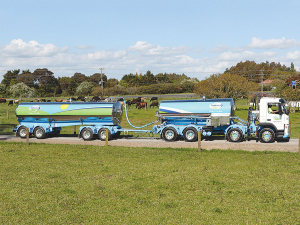Battle for milk
OPINION: Fonterra may be on the verge of selling its consumer business in New Zealand, but the co-operative is not keen on giving any ground to its competitors in the country.
 From 1 June 2021, Fonterra changed the way farmers are paid through the introduction of a new milk payment parameter.
From 1 June 2021, Fonterra changed the way farmers are paid through the introduction of a new milk payment parameter.
Milk quality is a key driver of value for Fonterra.
It enables the co-opeative to meet market regulations and the expectations of customers and consumers.
"When we get our milk quality right, we see improved quality, flavour, functionality, shelf life and yields.
"Low quality milk puts our reputation at risk, increases the risk of product quality failures and drives up the costs of transport and manufacturing."
From 1 June 2021, Fonterra changed the way farmers are paid for their milk through the introduction of a new milk payment parameter.
The 10 cent Co-operative Difference payment is made up of:
Once these have been achieved:
The Milk Quakity standard is measured and graded when the tanker driver collects and tests the milk. The milk is graded as either a downgrade, quality, or excellence.
The excellence grade is awarded when the milk meets a higher level of quality, above Fonterra's milk parameters.
Once the farmer achieves an excellence grade of 30 days across the season, then every day they achieve that grade would see the farmer qualify for the 3c/kgMS payment.
Fonterra says the Co-operative Difference means pulling the best of what farmers do into five focus areas and making sure they become the strongest possible foundations for the co-op.
"It doesn't mean losing your unique way of doing things on your farm.
"Instead, it will help us all work together as a strong co-operative.
"Getting the best returns is determined by our ability to access opportunities, markets, and premium prices. It is also important that the wider community value our role and our approach to farming, animal wellbeing and guardianship of the land, so that dairy farming is seen as an attractive and respected career choice for future generations.
"This means staying at the forefront of issues such as quality, safety and sustainability.
"That is what The Co-operative Difference is all about."
Milk Cooling Regulations
New milk cooling regulations came into effect from June 1 2018.
The rules state that raw milk must:
a) be cooled to 10°C or below within four hours of the commencement of milking; and
b) be cooled to 6°C or below within the sooner of:
i) six hours from the commencement of milking, or
ii) two hours from the completion of milking; and
c) be held at or below 6°C without freezing until collection or the next milking; and
d) must not exceed 10°C during subsequent milkings.
The rules apply to all farms.
Tickets are now available for Beef + Lamb New Zealand’s (B+LNZ) Out the Gate, returning from 19-21 May 2026 at Te Pae, Christchurch.
Dairy Women's Network (DWN) is welcoming AgriHealth as a new partner.
Northland Field Days patron Ross Newlove remembers the inaugural field days he attended 40 years ago.
Southland farmer Murray Donald has been appointed as chair of Safer Farms, the industry-led organisation focused on reducing harm, injuries and fatalities in the agricultural sector.
National Lamb Day returns this Sunday, 15 February, with Beef + Lamb New Zealand Inc calling on Kiwis to fire up their barbecues and celebrate the people and the product that put New Zealand on the world map.
When it comes to arranging the sound system at Northland Field Days, no one does it better than Colin Finlayson.
OPINION: Fonterra may be on the verge of selling its consumer business in New Zealand, but the co-operative is not…
OPINION: What does the birth rate in China have to do with stock trading? Just ask a2 Milk Company.